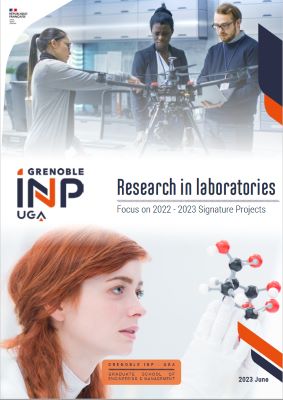 Neopost - the world's second largest supplier of solutions for handling mail - decided that, rather than simply suffer the new regulatory requirements (such as the WEEE, ROHS or REACH directives), it would pre-empt them in its design offices. Guillaume Moenne-Loccoz, specialist in sustainable development and head of eco-design at Neopost, explains: We have already incorporated the restrictions imposed by legislation into our design measures, legislation that is becoming increasingly strict regarding the toxicity of substances used in machinery or the end of life of our machines. In addition, our design teams are highly aware of the need to reduce the energy consumption of machines, which, for example, have an automatic device for putting them on standby and the Energy Star label. Last of all, we have worked with the G-SCOP laboratory on energy management as part of the Synergico project and the resulting innovations have been integrated into the new generations of our machines.
Neopost - the world's second largest supplier of solutions for handling mail - decided that, rather than simply suffer the new regulatory requirements (such as the WEEE, ROHS or REACH directives), it would pre-empt them in its design offices. Guillaume Moenne-Loccoz, specialist in sustainable development and head of eco-design at Neopost, explains: We have already incorporated the restrictions imposed by legislation into our design measures, legislation that is becoming increasingly strict regarding the toxicity of substances used in machinery or the end of life of our machines. In addition, our design teams are highly aware of the need to reduce the energy consumption of machines, which, for example, have an automatic device for putting them on standby and the Energy Star label. Last of all, we have worked with the G-SCOP laboratory on energy management as part of the Synergico project and the resulting innovations have been integrated into the new generations of our machines.With eco-design too often being reduced to the idea of energy efficiency, we should not overlook a product's end of life - after all: The ideal end of life for a product is for it to have a second life. Accordingly, Neopost recovers machines when their contracts come to an end and restores them to as new (the products are disassembled, worn parts are replaced, etc.) with a new product guarantee. Re-manufacturing today applies to 10 to 20% of Neopost's products on the French market. The company intends to increase this percentage over the next few years, putting into practice the same principle of the circular economy.
SUMMARY
- Editorial :The rise of eco-design
- Eco-design: a concept adopted by the world of business
- An approach supported by the authorities
- PIME: two-fold environmental expertise
- Neopost: "The ideal end of life for a product is to be born again'!"
- Schneider Electric: fifteen years of eco-design
- Soon all new ST products will be eco-designed
- A new life for lithium





